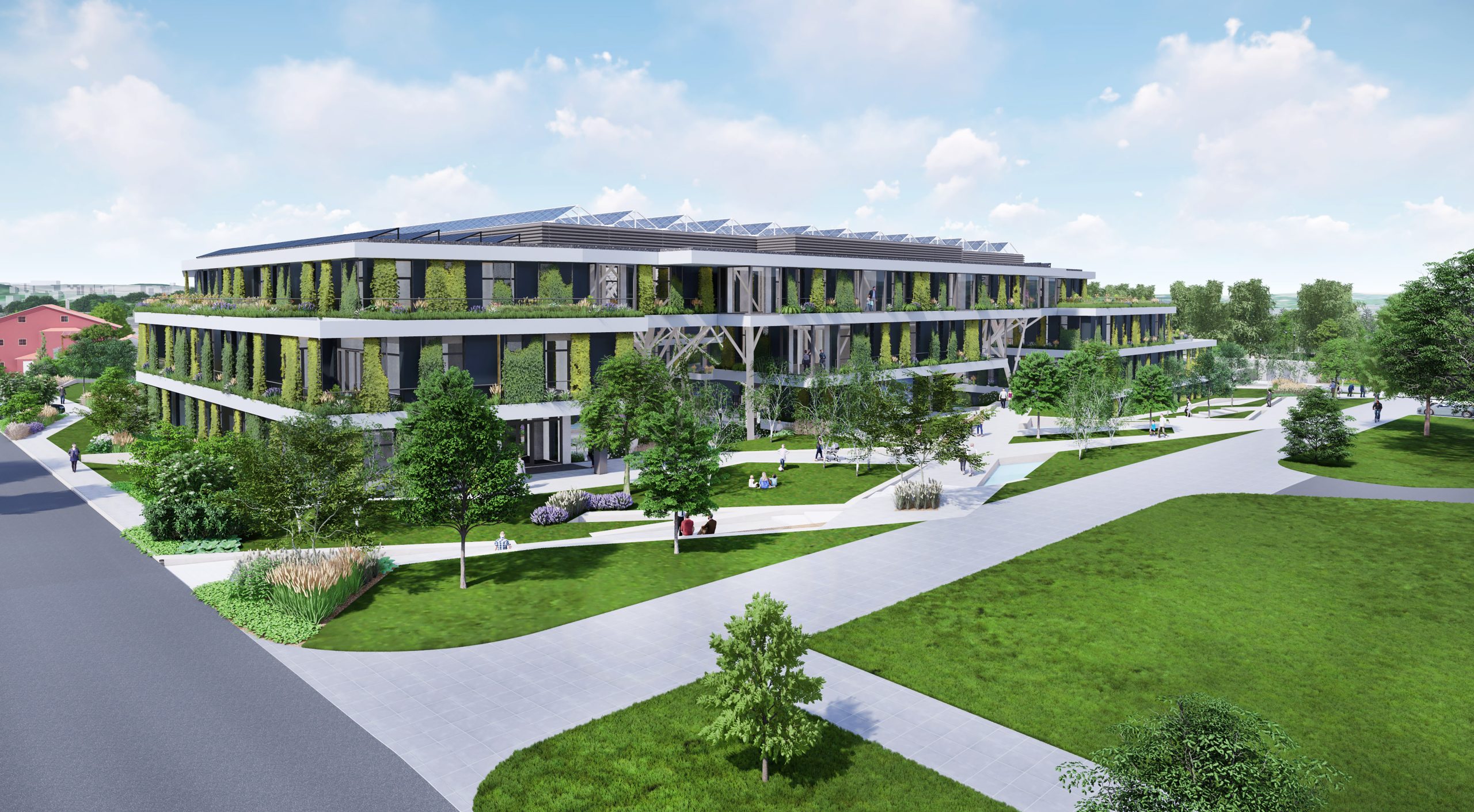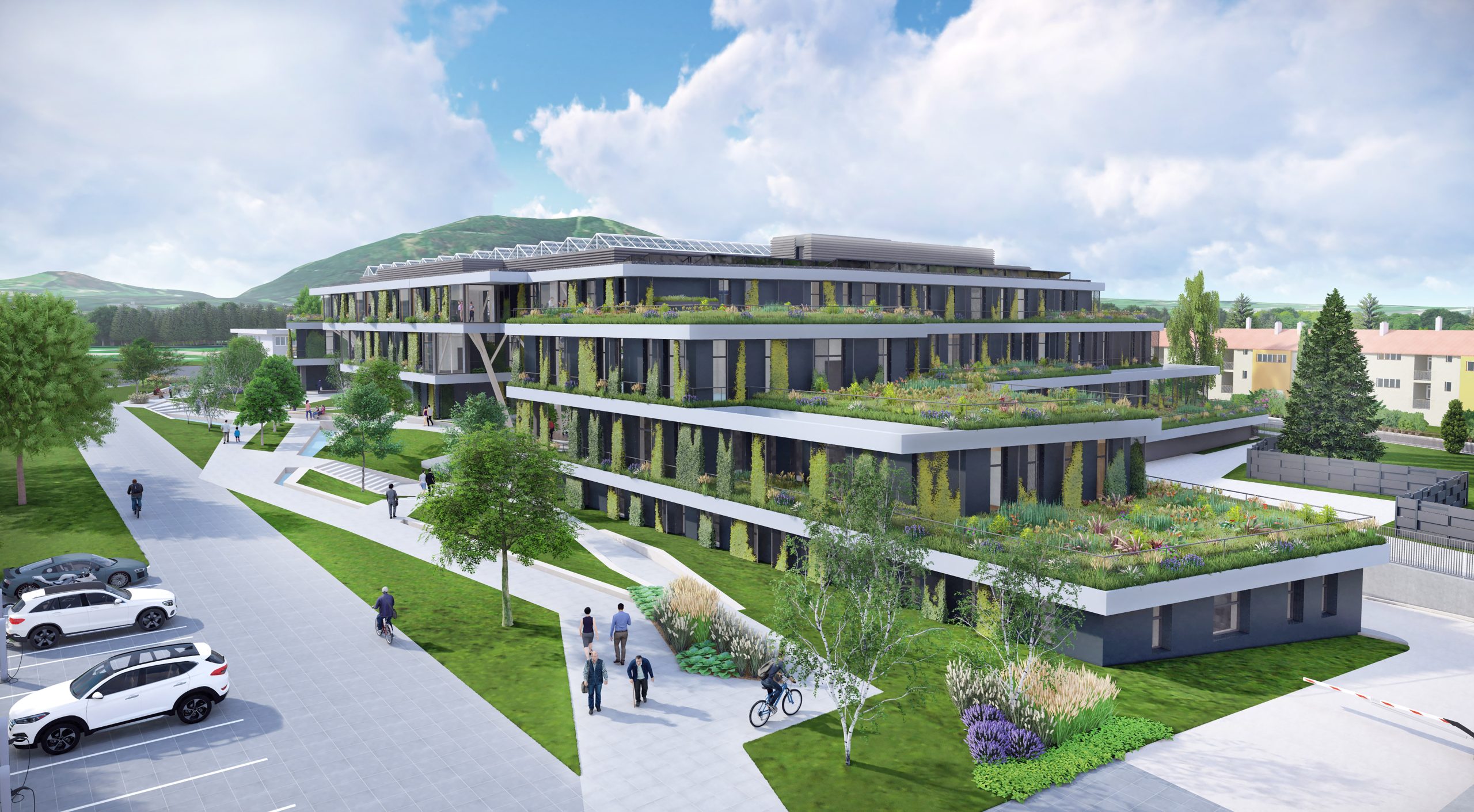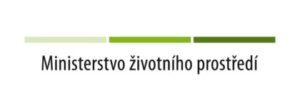Operational Programmes
This section contains projects that the Institute of Chemical Processes of the ASCR, v.v.i. obtained in the calls of the OP RDE. Individual projects are on offer below.
Operational Programme Science, Research and Education
- Project ACTRIS-CZ RI
The ACTRIS-CZ RI project supports the further development of the ACTRIS-CZ research infrastructure, the Czech national hub of the pan-European research infrastructure ACTRIS (Aerosol, Clouds and Trace Gases Research Infrastructure Network). ACTRIS-CZ is a unique research infrastructure dedicated to research and long-term monitoring of chemical and physical processes in the atmosphere included in the Czech Road Map of large infrastructures for research, experimental development, and innovation for the years 2016 to 2022.
The ACTRIS-CZ RI project aims to improve the technical background of this infrastructure located at the Košetice-Křešín Associated Station at Pacov (now the Košetice National Atmospheric Observatory), to strengthen its staff capacity and involvement in international networks, and subsequently to develop strategic research so as to create a competitive quality capable of delivering fully the objectives of the European ACTRIS infrastructure, which has been newly included in the Road Map of the European Strategic Forum for Research Infrastructures (ESFRI)in 2016.
The principal investigator of the ACTRIS-CZ RI project is the Institute of Chemical Process Fundamentals of the CAS.
The project partners are the Global Change Research Institute of the CAS and the Research Centre for Toxic Compounds in the Environment (RECETOX) of Masaryk University.
The project is provided with financial support from European Union. The Ministry of Education, Youth, and Sports as the Managing Authority of the Operational Program Research, Development and Education decided to provide a grant for the implementation of the ACTRIS-CZ RI project in the amount of CZK 58,442,717.70.
- Project ICPF Mobility
Project ICPF Mobility is focused on strengthening the international mobility of junior researchers from the Institute of Chemical Processes of the ASCR. 7 field trips to renowned workplaces in Germany, Austria, Italy, and France are planned, which will be attended by 4 postdoctoral students and 3 PhD students. An internship of a foreign postdoctoral student at ÚCHP is also planned, lasting 12 months with a focus on environmental processes. The project will be implemented in the period 2017 to 2020.
The main and only solver of the ICPF Mobility project is the Institute of Chemical Process Fundamentals of the CAS .
The project is provided with financial support from European Union funds. The Ministry of Education, Youth, and Sports, as the Managing Authority of the Operational Program Research, Development, and Education, decided to provide a subsidy for the implementation of the ICPF Mobility project in the amount of CZK 9,987,342.00.
List of events:
-
Seminar on Tuesday, May 15, 2019 from 9:00 am in the large meeting room of ICPF of the CAS.
- Project Strategic Partnership for environmental technologies and energy production
The Strategic Partnership for Environmental Technologies and Energy Production project is focused on deepening the cooperation of the Institute of Process Engineering FME BUT in Brno, the Institute of Chemical Processes of the CAS, and the Institute of Global Change Research of the CAS with UNIS and EVECO Brno in the following research areas:
-
Research of the circular economy in order to evaluate the real future needs of modern equipment for energy recovery of waste (ZEVO) and to evaluate the impact of future changes on conceptual solutions.
-
Research into the integration of individual elements and devices into modern ZEVO and research into unique integrated multifunctional units in order to achieve high efficiency of processes and relevant energy systems, the service life of technological units, and reduction of environmental impacts.
The project will use the advanced research infrastructure of the participating research organizations, which allows a multidisciplinary approach to solving the problem (chemical processes, energy, mechanical engineering, biotechnology). For the purposes of long-term cross-sectoral cooperation, the consortium of partners will also establish cooperation with other cooperating entities from the application and academic spheres at the national and international levels. An integral part is the effective dissemination of research results through standard forms of conferences and scientific colloquia, but also through one-off events. To increase the internationalization of research, cooperation will also be established with foreign entities, and the preparation of at least three follow-up international grants is expected.
- Project ICPF Mobility II
The ICPF Mobility II project is focused on strengthening the international mobility of junior researchers from the Institute of Chemical Process Fundamentals of the CAS. Nine internships at renowned workplaces in Denmark, Switzerland, France, Germany, New Zealand, Belgium, Portugal, Greece, and Austria are planned, which will be attended by 6 postdoctoral researchers and 3 Ph.D. students. The selected projects cover the majority of the main research interests of the institute.
Foreign institutes include:
- Danish Technical University (DTU) in Lyngby – Physical Chemistry
- Paul Scherrer Institute, Switzerland – Photoelectrochemistry
- University of Rennes, France – Material Science
- Technical University Darmstadt, Germany – High-pressure technologies
- Massey University in Auckland, New Zealand – Biotechnology
- Ghent University, Belgium – Environmental Chemistry
- University of Aveiro, Portugal – Metabolomics
- Technical University of Crete, Greece – Environmental Chemistry
- University of Natural Resources and Life Sciences, Vienna, Austria – Thermochemical processing of biomass
The project is provided with financial support from European Union. The Ministry of Education, Youth, and Sports, as the Managing Authority of the Operational Program Research, Development, and Education, decided to provide a grant for the implementation of the ICPF Mobility II project in the amount of CZK 7,094,936.29, while the total project budget is CZK 7,468,354.00.
- Project ACTRIS-CZ RI 2
The ACTRIS-CZ RI 2 project follows the ACTRIS-CZ RI project. The project supports the modernization and further expansion of the instrumentation of the large research infrastructure ACTRIS-CZ, which is a part of the Roadmap of large research infrastructures in the Czech Republic and is located at the National Atmospheric Observatory Košetice.
The main goal of the ACTRIS-CZ RI 2 project is to modernize and expand the instrumentation of the ACTRIS-CZ infrastructure, to increase and expand the portfolio of services provided by the infrastructure while maintaining their high quality. This will both increase the number of users of the research infrastructure, and the level of scientific information provided by the infrastructure. The project strengthens the position of the Czech Republic within the European research infrastructure ACTRIS ERIC and within the wider international community focusing on air quality, especially in relation to global climate change and impacts on public health.
The main recipient of the ACTRIS-CZ RI 2 project is the Institute of Chemical Process Fundamentals of the CAS, and the project partners are the Institute of Global Change Research Institute of the CAS and the Research Centre for Toxic Compounds in the Environment (RECETOX) of Masaryk University.
The project is provided with financial support from the European Union. The Ministry of Education, Youth, and Sports, as the Managing Authority of the Operational Program Research, Development, and Education, decided to provide a grant for the implementation of the ACTRIS-CZ RI 2 project in the amount of CZK 36,303,300.

Operational Programme Jan Amos Komenský
- Excellence Research in Regenerative Medicine (ExRegMed) – Project CZ.02.01.01/00/22_008/0004562
A research project entitled “Excellence Research in Regenerative Medicine (ExRegMed)” has succeeded in the call ” Excellence in Research” and has received support from the Johannes Amos Comenius Programme – OPJAK (available only in Czech). The project aims to create a Consortium, which will be involved in research in the therapeutic methods of regenerative medicine and tissue engineering. The project is expected to increase the competitiveness of the Czech Republic in this field of science, primarily through new applicable research and development results. The project activities focus on regenerating damaged tissues that cannot yet be treated or whose regenerative capacity is very limited.
The principal investigator of the project is the Institute of Experimental Medicine of the CAS, Institute of Chemical Process Fundamentals of the CAS is one of the partners of the project.
The project is provided with financial support from the European Union. The Ministry of Education, Youth, and Sports as the Managing Authority of the Operational Program Johannes Amos Comenius decided to provide a grant for the implementation of the project “Centre of Excellence in Regenerative Medicine” in the total amount of CZK 481,225,433.50.
- Project ACTRIS-CZ RI 3 – Project CZ.02.01.01/00/23_015/0008191
The ACTRIS-CZ RI 3 project follows the ACTRIS-CZ RI and ACTRIS-CZ RI 2 projects. The project supports the modernization and further expansion of the instrumentation of the large research infrastructure ACTRIS-CZ, which is a part of the Roadmap of large research infrastructures in the Czech Republic and is located at the National Atmospheric Observatory Košetice.
The main goal of the ACTRIS-CZ RI 3 project is to modernize and expand the instrumentation of the ACTRIS-CZ infrastructure, to increase and expand the portfolio of services provided by the infrastructure while maintaining their high quality. This will both increase the number of users of the research infrastructure, and the level of scientific information provided by the infrastructure. The project strengthens the position of the Czech Republic within the European research infrastructure ACTRIS ERIC and within the wider international community focusing on air quality, especially in relation to global climate change and impacts on public health.
The main recipient of the ACTRIS-CZ RI 3 project is the Institute of Chemical Process Fundamentals of the CAS, and the project partners are the Institute of Global Change Research Institute of the CAS, the Research Centre for Toxic Compounds in the Environment (RECETOX) of Masaryk University, and Institute of Atmospheric Physics of the CAS (IAP).
The project is provided with financial support from the European Union. The Ministry of Education, Youth, and Sports, as the Managing Authority of the Operational Program Research, Development, and Education, decided to provide a grant for the implementation of the ACTRIS-CZ RI 3 project in the amount of CZK 53 424 354,00.
3. Lifecycle of New Energy Sources (LiNES) – Project CZ.02.01.01/00/23_020/0008508, Cross-sectoral Cooperation
The project investigates new energy sources (NES) at several levels, from developing innovative technologies for energy storage and preventing risks associated with NSE operation to managing NSE as a source of secondary raw materials. With the expansion of new energy sources in the EU, a scientific problem arises in assessing safety, especially in the medium and long term. The project assesses the risks of NSE to human health and safety, optimizes using these sources, and examines the economic and environmental impacts. It focuses on research into new materials, battery diagnostics, and incident prevention, innovative environmentally friendly processing of NSE, and an overall assessment of the environmental impacts of NSE.
The main recipient of the LiNES project is the Institute of Chemical Process Fundamentals of the CAS, and the project partners are the Institute of Process Engineering (BUT, FMI), Department of Sustainability and Product Ecology (UCT in Praque, FET) and ORGREZ, a.s.
Operational Programme Environment
- Project MOSKAL
Operational Programme Enterprise and Innovation for Competitiveness
- Project Research and Development of CASND Atomizer II, drying equipment for production of encapsulated substances.
The aim of the project is the technical realization of a drying device of a completely new type called CASND Advanced Atomizer (acronym CA Atomizer II). Verification will be carried out by the implementation of proven technology for spray nebulization drying (CASND technology – carbon dioxide assisted spray nebulization drying), implementation of a series of technical functional verification (shift from TRL3 to TRL7), and further elaboration of underlying technical-economic documents. Experimental testing of the rotary atomization disk has shown its principal functionality, but also a number of drawbacks – these can be eliminated by replacing it with other nebulization systems that operate on a completely different principle. The new unique atomizing device is structurally much simpler and cheaper than the rotary atomizing disk used up to now.
Operational Programme Just Transition
- CirkArena
CirkArena is a planned research and development center for the circular economy. It will bring together excellent scientific and innovation teams and capacities with the ambition to integrate its workplaces in Třinec and Ostrava into the system of national reference laboratories. CirkArena is built based on a broad partnership of research and educational organizations and the public sector. It will be a bridge between the technological and knowledge base and will help accelerate research and development, innovation, and education activities in the field of the circular economy.
The Just Transition Operational Programme is a European Union instrument that supports the regions most affected by the transition to a low-carbon economy. In the Czech Republic, it is primarily focused on the Moravian-Silesian, Ústí nad Labem, and Karlovy Vary regions and aims to create new jobs, support innovation, and reduce the socio-economic impacts of the transition on local residents.
The project aims to create a new scientific infrastructure, a research and development center for the circular economy, and a competence center, which will concentrate scientific and research and development capacities, including a system of national reference laboratories for the center’s strategic research agenda. The circular economy replaces the traditional “make—use—throw away” model with a system where materials are reused. This approach reduces the burden on the environment and brings new economic opportunities that have the potential to improve life in the region.
 |
 |
 |
The main project sponsor: Materials and Metallurgical Research, s.r.o.
Project partners:
- College of Mining – Technical University of Ostrava
- Brno University of Technology
- Czech University of Technology in Prague
- Institute of Chemical Process Fundamentals of the CAS
- Czech Technology Platform for Sustainable Chemistry
- Institute of Circular Economy, z.ú.
- Smart & Open Base for Innovations in European Cities and Regions, z.ú.
- Statutory city of Trinec
- Regional Development and Cooperation Council based in Třinec
- Moravian-Silesian Innovation Center





